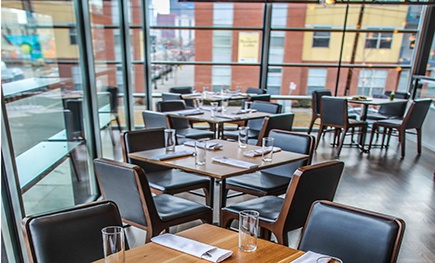As reported by the National Restaurant Association and other industry experts, there are over one million restaurants in the United States, but the failure rate is very high (a majority close within three to five years). With online shopping and delivery becoming more and more prevalent, landlords of all types have faced increasing vacancies for traditional retail stores.
As a landlord of an office, mixed use, shopping center or stand-alone retail rented property seeking to fill a vacancy, there are five important factors to consider before marketing the property or executing a lease agreement with a restaurant.
- Suitability of the Building and the Premises
The premises must meet certain requirements on both the exterior and the interior for it to be attractive for a successful restaurant operation. From the exterior, it is important whether the space is visible from the street or an entrance to the property. Also, the availability of an outdoor patio or rooftop seating may be crucial for marketing purposes. From the inside perspective, the space must have handicap accessibility, adequate floor load for heavy fixtures and equipment, and access to efficient loading and refuse facilities.
Further, the space should currently have a kitchen or the ability to add one with appropriate HVAC, exhaust, grease trap, odor control and fire suppression systems. Restaurant tenants most often demand higher than typical utility requirements for electricity, water, sewer, natural gas and cable/satellite dish facilities.
In addition to the physical issues, the landlord should assess whether there are restrictive easements or covenants, or existing exclusive use, or prohibited use clauses in existing leases, that would prohibit a restaurant. Many of these restrictions may not turn up in a review of the title to the property.
- Land Use and Licensing Issues
Landlords need to determine whether a restaurant use will comply with local zoning laws in regards to use, outdoor seating, parking and signage. Additionally, depending on the type of restaurant, the economic viability of the business may rest upon the ability of the tenant to obtain necessary liquor licenses.
- Impact on Other Tenants, Residents or Users
The property owner/landlord needs to be sure that leasing space to a food establishment will not result in any adverse impact on existing tenants, residents or other occupants of the property. By their nature, restaurants create unique impacts in terms of kitchen exhausts, other odors, noise, garbage, rodent and pest control issues, security and demands on loading and storage. The landlord needs to be cautious that it is not creating a nuisance for the other users than outweighs the benefit of the restaurant.
- Tenant’s Background, Experience, and Creditworthiness
A landlord considering a restaurant use should look for certain things in choosing whether to lease to a particular tenant. Specifically, the restaurant’s concept, the financial health of the potential tenant, and the tenant’s past experience are all very important.
Ideally, the landlord would want assurances that the tenant has a plan for success. A business plan should be in place describing the concept of the restaurant and its menu, how it will be financed, the management structure, whether a supply chain for food has been established, how the business will be marketed, and who will control the day-to-day decision making.
The prospective tenant must have such creditworthiness that it has funding for the initial capital improvements, and the ability to meet payroll and make the monthly rent payments. Even a tenant that is financially strong may be a risk if they have never operated a restaurant before. Experience and reputation in the food industry may be just as important as financial standing, especially if the operator has “deep pocket” partners that can put up a lease guaranty.
- Economics of the Deal
Before entering into a commercial lease agreement, the landlord needs to consider the economics and terms of the transaction. As noted above, the failure rate of most restaurants is high and proves to be quicker than the initial term of a typical lease.
If the lease will be conditioned upon the landlord providing a significant financial incentive in the form of work it must perform to the premises or the building prior to delivery, or in the form of a cash allowance to be used by the tenant to build out the space, then the landlord may never recover this investment if the business fails before the lease term expires.
Frequently, the fixtures, equipment and other hard and soft costs that the landlord has provided will not be usable by the next tenant coming into the space or will be removed by the entity that loaned money to the tenant to purchase such items. Further, a tenant may make demands in the lease agreement for clauses that restrict the remainder of the property such as exclusive use provisions, reserved parking, use of common areas, or relaxed assignment and subletting criteria.
Conclusion
Ultimately, even with careful investigation on the part of the landlord, the success or failure of a restaurant in a particular location will depend on the quality and value of the food being served and the type of service being provided by the staff to the customers. The likelihood of a successful landlord-tenant relationship will improve, however, if the owner does some prudent due diligence of both the space and the prospective tenant prior to signing a lease.

